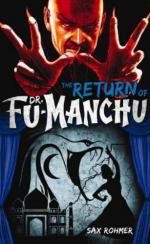I pushed open the cupboard door and thrust out the Browning. As I did so a dramatic thing happened. A tall, gaunt figure shot suddenly upright from beyond the bed. It was Nayland Smith!
Upraised in his hand he held a heavy walking cane. I knew the handle to be leaded, and I could judge of the force with which he wielded it by the fact that it cut the air with a keen swishing sound. It descended upon the back of the mulatto’s skull with a sickening thud, and the great brown body dropped inert upon the padded bed—in which not Smith, but his grip, reposed. There was no word, no cry. Then:
“Shoot, Petrie! Shoot the fiend! Shoot . . .”
Van Roon, dropping the candle, in the falling gleam of which I saw the whites of the oblique eyes turned and leaped from the room with the agility of a wild cat. The ensuing darkness was split by a streak of lightning . . . and there was Nayland Smith scrambling around the foot of the bed and making for the door in hot pursuit.
We gained it almost together. Smith had dropped the cane, and now held his pistol in his hand. Together we fired into the chasm of the corridor, and in the flash, saw Van Roon hurling himself down the stairs. He went silently in his stockinged feet, and our own clatter was drowned by the awful booming of the thunder which now burst over us again.
Crack!—crack!—crack! Three times our pistols spat venomously after the flying figure . . . then we had crossed the hall below and were in the wilderness of the night with the rain descending upon us in sheets. Vaguely I saw the white shirt-sleeves of the fugitive near the corner of the stone fence. A moment he hesitated, then darted away inland, not toward Saul, but toward the moor and the cup of the inland bay.
“Steady, Petrie! steady!” cried Nayland Smith. He ran, panting, beside me. “It is the path to the mire.” He breathed sibilantly between every few words. “It was out there . . . that he hoped to lure us . . . with the cry for help.”
A great blaze of lightning illuminated the landscape as far as the eye could see. Ahead of us a flying shape, hair lank and glistening in the downpour, followed a faint path skirting that green tongue of morass which we had noted from the upland. It was Kegan Van Roon. He glanced over his shoulder, showing a yellow, terror-stricken face. We were gaining upon him. Darkness fell, and the thunder cracked and boomed as though the very moor were splitting about us.
“Another fifty yards, Petrie,” breathed Nayland Smith, “and after that it’s unchartered ground.”
On we went through the rain and the darkness; then:
“Slow up! slow up!” cried Smith. “It feels soft!”
Indeed, already I had made one false step—and the hungry mire had fastened upon my foot, almost tripping me.
“Lost the path!”
We stopped dead. The falling rain walled us in. I dared not move, for I knew that the mire, the devouring mire, stretched, eager, close about my feet. We were both waiting for the next flash of lightning, I think, but, before it came, out of the darkness ahead of us rose a cry that sometimes rings in my ears to this hour. Yet it was no more than a repetition of that which had called to us, deathfully, awhile before.




